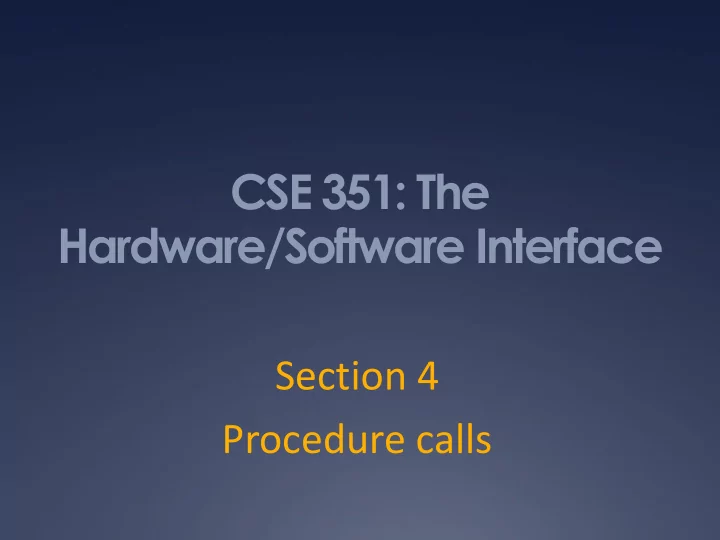

CSE 351: The Hardware/Software Interface Section 4 Procedure calls
Procedure calls In x86 assembly, values are passed to function calls on the stack Perks: Concise, easy to remember Drawbacks: Always requires memory accesses In x86-64 assembly, values are passed to function calls in registers Perks: Less wasted space Drawbacks: Potentially requires a lot of register manipulation 1/31/13 2
x86 calling conventions Simply push arguments onto the stack in order, then “call” the function! Suppose we define the following function: int sum(int a, int b) { return a + b; } (See also sum.c from the provided code) 1/31/13 3
x86 calling conventions int sum(int a, int b) { return a + b; } In assembly, we have something like this: sum: pushl %ebp # Save base pointer movl %esp, %ebp # Save stack pointer movl 12(%ebp), %eax # Load b movl 8(%ebp), %edx # Load a addl %edx, %eax # Compute a + b popl %ebp # Restore base pointer ret # Return 1/31/13 4
x86 calling conventions What is happening with %ebp and %esp? pushl %ebp The base pointer %ebp is the address of the caller, which is the location to which “ret” returns. The function pushes it into the stack so that it won’t be overwritten movl %esp, %ebp Functions often shift the stack pointer to allocate temporary stack space, so this instruction makes a backup of the original location. In the body of the function, %ebp is now the original start of the stack ret When sum() returns, execution picks up at the stored base pointer address. The return value is passed back through %eax 1/31/13 5
x86 calling conventions Now let’s look at the caller’s side of things int a = 3, b = 2; int c = sum(a, b); In assembly code, we have something like this: movl $3, 20(%esp) # Store a = 3 movl $2, 24(%esp) # Store b = 3 movl 24(%esp), %eax # Load b movl %eax, 4(%esp) # Store b for call movl 20(%esp), %eax # Load a movl %eax, (%esp) # Store a for call call sum # Call the sum() function 1/31/13 6
x86 calling conventions Note that the given assembly code is terribly inefficient, but it’s what GCC will emit without any optimization The value to which the stack pointer %esp points is the first parameter (a in this case) while the second (b) is stored just above at 4(%esp) 1/31/13 7
x86-64 calling conventions %rdi, %rsi, %rdx, %rcx, %r8, and %r9 act as the first through sixth arguments to functions The return value from a function is stored in %rax All of these registers are caller-saved (more on this later) 1/31/13 8
x86-64 calling conventions The sum example from earlier in x86-64: sum: pushq %rbp # Save base pointer movq %rsp, %rbp # Save stack pointer movl %edi, -4(%rbp) # Store a movl %esi, -8(%rbp) # Store b movl -8(%rbp), %eax # Load b movl -4(%rbp), %edx # Load a addl %edx, %eax # Compute a + b popq %rbp # Restore a + b ret # Return Again, this is unoptimized GCC output 1/31/13 9
x86-64 calling conventions What changed compared to the x86 example? a and b passed through %rdi (actually %edi, since it’s an int) and %rsi (%esi) Manipulation of %rbp and %rsp is just like that of %ebp and %esp in the x86 version 1/31/13 10
x86-64 calling conventions From the caller’s side: movl $3, -12(%rbp) # Store a movl $2, -8(%rbp) # Store b movl -8(%rbp), %edx # Load b movl -12(%rbp), %eax # Load a movl %edx, %esi # Move b to %esi movl %eax, %edi # Move a to %edi call sum # Call the sum() function Lots of wasteful register and stack manipulation, but 3 and 2 end up as first and second parameters to call to sum() 1/31/13 11
Caller- versus callee-saved Some registers are caller-saved, whereas some are callee-saved Caller-saved: If the contents of the register need to be preserved, the caller should save them on the stack prior to invoking a function Callee-saved: If the callee of a function wants to use a register, it must save the value and restore it to the register before returning 1/31/13 12
Caller- versus callee-saved In x86, the callee-saved registers are %edx, %esi, %edi, and %ebp; all others are caller- saved In x86-64, the callee-saved registers are %rbx, %rbp, and %r12-%r15; all others are caller-saved Why use a callee-saved register versus a caller-saved register and vice versa? 1/31/13 13
Calling convention examples Next we’ll take a look at some examples to go over usage of these conventions The code is available under today’s section on the course calendar After running “make”, you’ll have a some binary files, some assembly files (.s), and some listing files (.lst), the latter of which contains a mix of assembly and the original C code that was used to generate it 1/31/13 14
Recommend
More recommend